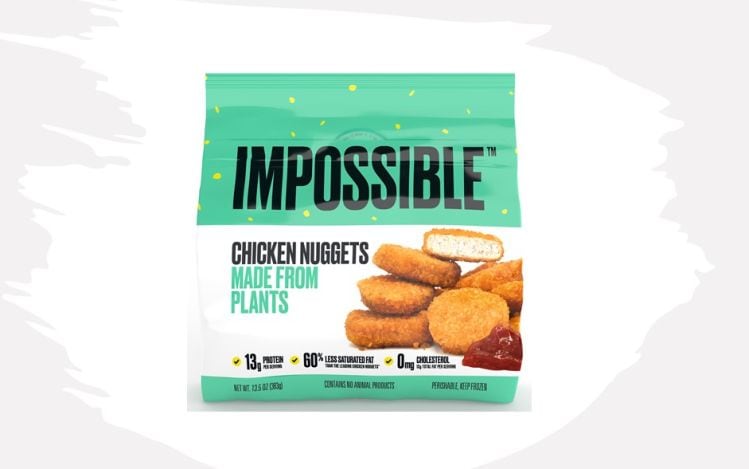The retail product – which has “slightly lower saturated fat, more protein, and a little bit more sodium” than the restaurant version – is made with soy protein concentrate, wheat flour, sunflower oil, soybean oil, and corn starch, and like other Impossible Foods products, is fortified with vitamins and minerals including zinc (25%DV) and B12 (60%DV).
Unlike Beyond Meat’s new chicken tenders, Impossible Nuggets don’t contain titanium dioxide, a whitening agent that’s approved as a color additive exempt from certification in the US, but has attracted more scrutiny lately after the European Food Safety Authority said it “can no longer be considered a safe additive.”
A five-piece serving of Impossible Chicken nuggets contains 240 calories, 13g protein, 1.5g saturated fat (far less than the Impossible Burger), 2g fiber and 480mg sodium. To place this in context, a serving of Tyson chicken nuggets contains 255 cals, 13g protein, 4g saturated fat, 0g fiber, and 444mg sodium.
In a blind taste test of Impossible Chicken Nuggets for restaurants among 201 meat-eating consumers in Irving, Texas, many of whom regularly eat plant-based products, seven out of 10 preferred the Impossible Chicken Nuggets to the leading animal-based chicken nuggets, said president Dennis Woodside.
“Our technology platform allows us to recreate animal products across protein categories that outperform the animal versions in every way.”
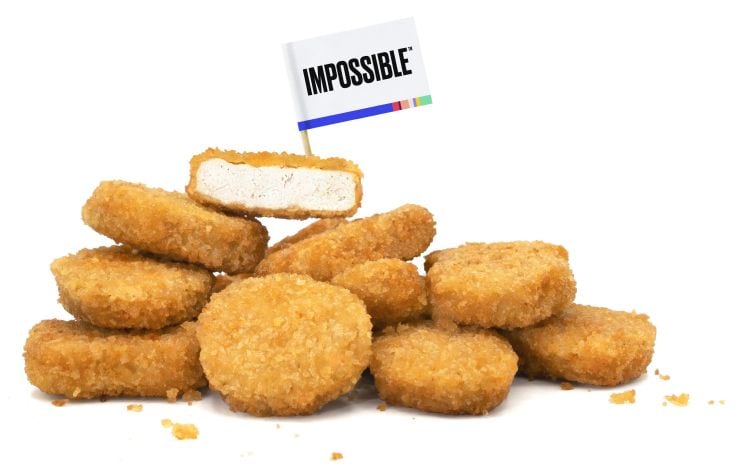
Ingredient list (retail nuggets): Water, soy protein concentrate, wheat flour, sunflower oil, soybean oil, corn starch, 2% or less of: methylcellulose, salt, natural flavors, wheat starch, cultured dextrose, dried onion, dried garlic, dextrose, food starch modified, yeast extract, yellow corn flour, paprika and turmeric extract (for color), dextrin, black pepper, leavening (cream of tartar, sodium bicarbonate), rice four, dried yeast, mixed tocopherols (antioxidant), guar gum vitamins and minerals: zinc gluconate, thiamine hydrochloride (vitamin B1), niacin (vitamin B3), calcium pantothenate (vitamin B5), pyridoxine hydrochloride (vitamin B6), riboflavin (vitamin B2), vitamin B12
Nutrition Facts: A five-piece serving contains 240 calories, 13g protein, 1.5g saturated fat (far less than Impossible Burgers), and 2g fiber.
Plant-based chicken
If the market for plant-based beef and pork products (burgers, sausages, grounds etc) is becoming increasingly crowded with food tech players, startups, and legacy plant-based brands now jostling for space with major CPG brands and the world’s biggest meat companies; plant-based chicken is quickly becoming just as competitive.
Players with offerings in the space include Quorn, Gardein (Conagra Brands), Morningstar Farms (Kellogg), BOCA (Kraft Heinz), Nestle (Sweet Earth Foods), Tofurky, and No Evil.
Beyond Meat, meanwhile, has just launched pea-, and faba bean-based tenders in selected US restaurants and nuggets in the Canadian retail market (with A&W Canada); while Lightlife Foods (Maple Leaf) recently upped the ante with plant-based chicken fillets; meat giant Tyson has entered the fray with Raised & Rooted nuggets; private label ranges are beginning to pop up from players including Target (Good & Gather) and Kroger (Simple Truth), and a wave of new players has recently entered the market including Livekindly, Alpha Foods, Daring Foods, NUGGS (Simulate), and Nowadays.
VFC – a fried chicken brand co-founded by Veganuary and Veg Capital co-founder Matthew Glover -- is also gearing up for a move into the US market.
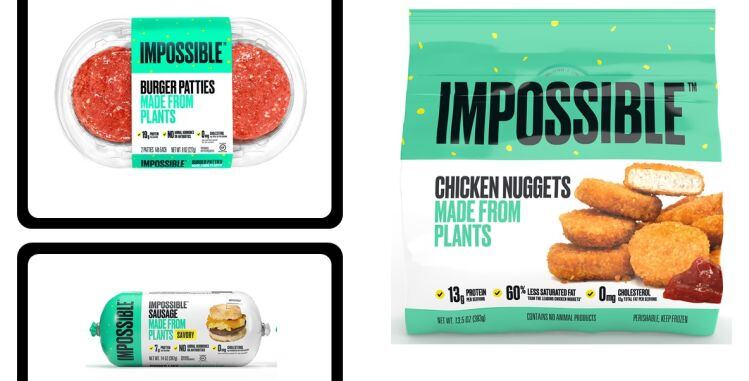
Dr Pat Brown: 'When you cross that threshold and familiarity, the adoption curve will be fast…'
San Francisco-based Impossible Foods entered the foodservice market in 2016 and made an aggressive push into retail in 2020. It does not disclose revenues, but is now in around 22,000 grocery stores and 30,000+ foodservice locations across the US, Canada, Hong Kong and Singapore.
The firm – which has a stated goal to “produce a full range of meats and dairy products for every cultural region in the world” – is best-known for its plant-based beef, pork, and now chicken. However, it is also working on steak, seafood, and eggs, and has teased a plant-based milk product claimed to be “better than anything that comes from a cow."
Although plant-based meats currently account for just 2% of the market, and the conventional meat industry continues to grow, Brown told delegates at the recent Future Food Tech alternative proteins conference that he remains “very confident that in five years, there will be beef, pork and chicken products made from plants that in the perception of mainstream consumers are more delicious, more nutritious, and more affordable than the slaughterhouse derived products that are available today.
“And when you cross that threshold and familiarity,” he predicted, “the adoption curve will be fast…"
US retail sales, plant-based meat
According to SPINS data, US retail sales of plant-based meat rose 13.2% to $1.409bn in the 52 weeks to July 11, 2021.
Frozen sales were up 9.54% to $823.9m, while refrigerated sales were up 18.85% to $585.5m over the same period.
Frozen nuggets, strips, and cutlets were up 10.4%, while refrigerated nuggets, strips, and cutlets (a far smaller market) were up 19%.
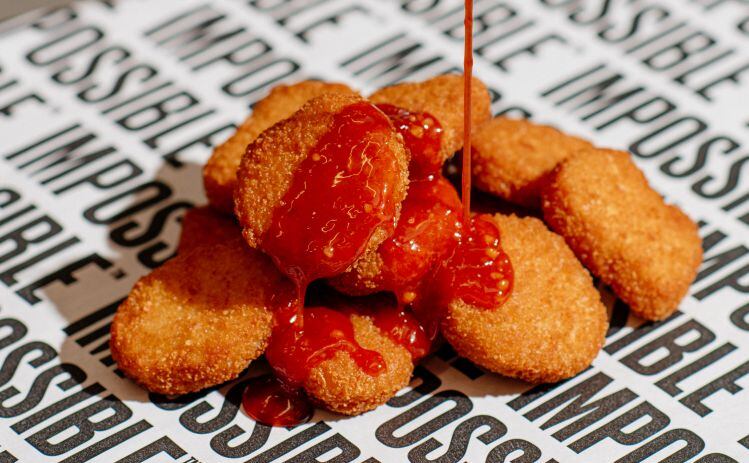
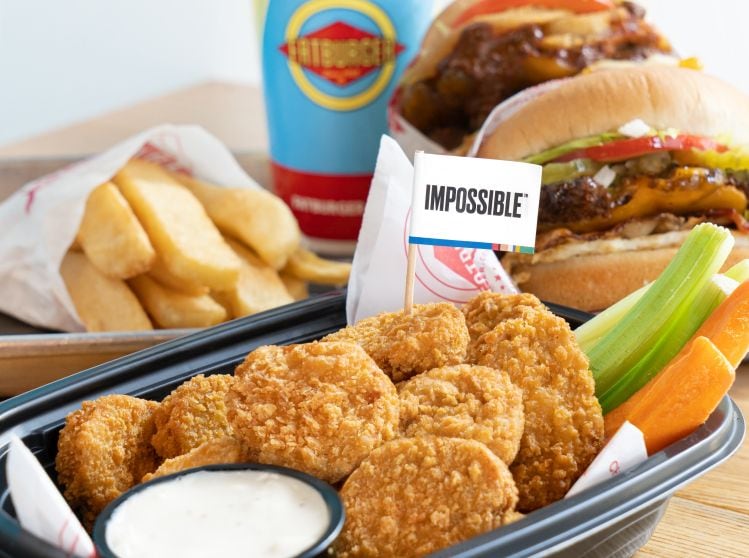
Based on a preliminary life cycle assessment of the product, Impossible Chicken Nuggets use 48-49% less land, 43-44% less water and generate 36% less GHG emissions than the animal version, claims the company.
Pic credit: Fatburger

